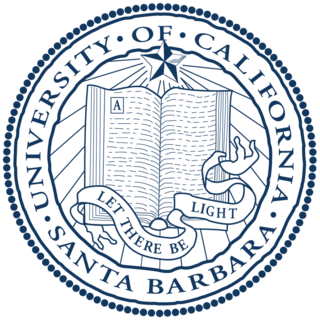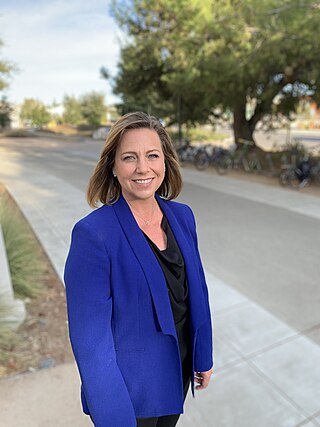Related Research Articles

The University of California, San Francisco (UCSF), is a public land-grant research university in San Francisco, California, United States. It is part of the University of California system and is dedicated entirely to health science and life science. It conducts research and teaching in medical and biological sciences.

The University of California, Santa Cruz is a public land-grant research university in Santa Cruz, California, United States. It is one of the ten campuses in the University of California system. Located on Monterey Bay, on the edge of the coastal community of Santa Cruz, the main campus lies on 2,001 acres (810 ha) of rolling, forested hills overlooking the Pacific Ocean. As of Fall 2023, its ten residential colleges enroll some 17,812 undergraduate and 1,952 graduate students. Satellite facilities in other Santa Cruz locations include the Coastal Science Campus and the Westside Research Park and the Silicon Valley Center in Santa Clara, along with administrative control of the Lick Observatory near San Jose in the Diablo Range and the Keck Observatory near the summit of Mauna Kea in Hawaii.

The University of California, Santa Barbara is a public land-grant research university in Santa Barbara County, California, United States. Tracing its roots back to 1891 as an independent teachers' college, UCSB joined the University of California system in 1944. It is the third-oldest undergraduate campus in the system, after UC Berkeley and UCLA.

The UC Berkeley Graduate School of Journalism is a graduate professional school on the campus of University of California, Berkeley. It is designed to produce journalists with a two-year Master of Journalism (MJ) degree. It also offers a summer minor in journalism to undergraduates and a journalism certificate option to non–UC Berkeley students.

Laurie Garrett is an American science journalist and author. She was awarded the Pulitzer Prize for Explanatory Journalism in 1996 for a series of works published in Newsday that chronicled the Ebola virus outbreak in Zaire.

The University of California, Berkeley School of Public Health, also called Berkeley Public Health, is one of fourteen schools and colleges at the University of California, Berkeley. The school is currently accredited by the Council on Education for Public Health.
Judith "Judy" Yung was a librarian, community activist, historian and professor emerita in American Studies at the University of California, Santa Cruz. She specialized in oral history, women's history, and Asian American history. She died on December 14, 2020, in San Francisco, where she had returned in 2018.
City on a Hill Press, originally launched in 1966 as The Fulcrum, is the weekly student newspaper of the University of California, Santa Cruz (UCSC). Designed as a magazine, the weekly tabloid-sized paper releases new issues every Thursday of the fall, winter and spring academic quarters, as well as a back-to-school issue entitled "Primer" at the end of the summer session, for a total of 30 issues per school year.

Narinder Singh Kapany was an Indian-American physicist best known for his work on fiber optics. Kapany is a pioneer in the field of fiber optics, known for coining and popularising the term. Fortune named him one of seven "Unsung Heroes of the 20th Century" for his Nobel Prize-deserving invention. He was awarded India's second highest civilian award, the Padma Vibhushan, posthumously in 2021. He served as an Indian Ordnance Factories Service (IOFS) officer. He was also offered the post of Scientific Adviser to the Defence Minister of India, by the first Prime Minister of India, Jawaharlal Nehru. He is considered the father of Fiber Optics.

The California Institute for Quantitative Biosciences (QB3) is a nonprofit research and technology commercialization institute affiliated with three University of California campuses in the San Francisco Bay Area: Berkeley, San Francisco, and Santa Cruz. QB3's domain is the quantitative biosciences: areas of biology in which advances are chiefly made by scientists applying techniques from physics, chemistry, engineering, and computer science.

Sheri Fink is an American journalist who writes about health, medicine and science.
The University of California High-Performance AstroComputing Center (UC-HiPACC) based at the University of California at Santa Cruz (UCSC) is a consortium of nine University of California campuses and three Department of Energy laboratories. The consortium's goal is to support and facilitate original research and education in computational astrophysics and to engage in public outreach and education.

Faye Flam is an American journalist. She has written for Science Magazine and wrote two weekly columns for The Philadelphia Inquirer, including one on sex and one on evolution. Flam wrote a book on the influence of sex on human evolution and society. She teaches science writing and lectures on communication to scientific forums, and is a journalism critic for the MIT Knight Science Journalism Tracker.
Anne Walsh Rimoin is an American infectious disease epidemiologist whose research focuses on emerging infectious diseases (EIDs), particularly those that are crossing species from animal to human populations. She is a professor of epidemiology at the UCLA Fielding School of Public Health and Infectious Disease Division of the Geffen School of Medicine and is the Director of the Center for Global and Immigrant Health. She is an internationally recognized expert on the epidemiology of Ebola, human mpox, and disease emergence in Central Africa.
Nadia Drake is an American science journalist and is the interim Physics Editor at Quanta Magazine. Previously, she was a contributing writer at National Geographic.

Jonna Ann Keener Mazet is an American veterinarian, epidemiologist and a Distinguished Professor of Epidemiology and Disease Ecology at the University of California, Davis. Since 2021, she has served as the Vice Provost of Grand Challenges at the University of California, Davis where she provides leadership for transdisciplinary research and solution-oriented activities dedicated to global health problem solving across. UC Davis Grand Challenges focuses on developing climate solutions, preventing and responding to emerging health threats, promoting sustainable food systems, and reimagining the role of land-grant universities. Dr. Mazet is known for her long-standing achievements and contributions to operationalizing the One Health approach, which is now a key component of the Quadripartite Organizations core mandates for addressing health challenges. In 2009, Dr. Mazet founded the One Health Institute at the University of California, Davis and served as the Executive Director until July 2020. Recognized for her innovative and holistic approach to emerging environmental and global health threats, she is an elected member of the National Academy of Medicine and a fellow of the American Association for the Advancement of Science.

The 2018 Équateur province Ebola outbreak occurred in the north-west of the Democratic Republic of the Congo (DRC) from May to July 2018. It was contained entirely within Équateur province, and was the first time that vaccination with the rVSV-ZEBOV Ebola vaccine had been attempted in the early stages of an Ebola outbreak, with a total of 3,481 people vaccinated. It was the ninth recorded Ebola outbreak in the DRC.
Erika S. Zavaleta is an American professor of ecology and evolutionary biology at the University of California, Santa Cruz. Zavaleta is recognized for her research focusing on topics including plant community ecology, conservation practices for terrestrial ecosystems, and impacts of community dynamics on ecosystem functions.
Martha Mendoza is an Associated Press journalist whose reporting has helped free over 2,000 enslaved fishermen and prompted action by the U.S. Congress and the White House.

Seema Yasmin is a British-American physician, writer and science communicator based at Stanford University. She is Director of Research and Education at the Stanford Health Communication Initiative. During the COVID-19 pandemic, Yasmin helped to debunk myths about the coronavirus.
References
- 1 2 3 4 5 6 "Erika Check Hayden will be new director of Science Communication Program". UC Santa Cruz News. September 15, 2016. Retrieved July 18, 2018.
- ↑ "Science writing faculty". University of California, Santa Cruz. Retrieved July 18, 2018.
- ↑ Ibarra, Nicholas (July 25, 2017). "New UC Santa Cruz Science Communication director sees groundswell of support for field". Santa Cruz Sentinel. Retrieved July 18, 2018.
- ↑ "Erika Check Hayden". Center for Energy Efficient Electronics Science. Retrieved July 18, 2018.
- ↑ Angler, Martin W. (June 14, 2017). Science Journalism: An Introduction. Taylor & Francis. p. 332. ISBN 9781317369820.
- ↑ "Erika Check Hayden Honored in Awards for Excellence in Health Care Journalism Competition". Pulitzer Center. March 7, 2016. Retrieved July 18, 2018.